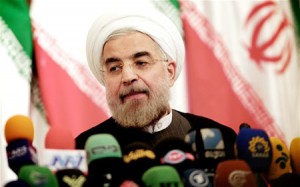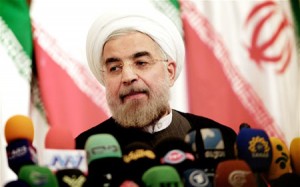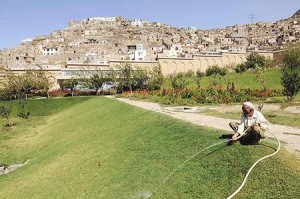The Guardian
Editorial
President Hassan Rouhani’s whirlwind visit to Europe last week was an indication both of how eager Iran is to shed its pariah status and of how eager western countries are to resume trade and financial relations now that international sanctions are being lifted. Dozens of contracts running into billions of dollars were discussed. He met the pope, the Italian prime minister, the French president, and many business leaders.
The security services continue to harass and detain activists, writers and journalists
After years of tensions and mistrust, the scenes of a smiling Iranian leader being welcomed with open arms in European capitals were in stark contrast with the recent past. Yet in spite of the feelgood imagery, to believe that Iran’s regime has altogether transformed itself and might now be moving towards decisive domestic reform and a constructive role on the international stage would be naive and shortsighted.
Iran may have a president with a “moderate” profile – one whose smooth approach comes as a relief after the Ahmadinejad years – but that does not mean the authoritarian nature of the regime or the objectives of its foreign policy have changed. Iran still ranks as one of the most repressive states in the world, and there has been no improvement.
The government was probably looking for a public relations bonus in the west when it recently released a number of journalists, but the statistics tell another story: in 2015 Iran executed at least 830 people, including juveniles, many for non-violent crimes. The security services continue to harass and detain activists, writers and journalists. The methods used by the regime to crush the pro-democracy Green movement in 2009 are still very much in use today.
Nor has Iran become in any way more “moderate” in its behaviour in the Middle East. In Syria, Iran’s militias and Republican Guards are direct participants in the war crimes that the Assad regime inflicts on its own population. Iran’s close ally Hezbollah played a key role in the siege of Madaya, where children died of hunger as a result, and it is part of similar operations elsewhere.
It is to be hoped that a sustained implementation of the nuclear agreement will improve international security. But to draw from that the notion that Iran must now be spared any reproach would be foolish. Iran’s hardliners sought economic relief through the nuclear deal because they desperately want to keep their hold on power, not because they want to pursue a more democratic path at home or more rational policies abroad. Diplomacy is important, but it must not come at the expense of clearsightedness, nor should it be accompanied by the kind of simplistic analysis that puts the sole onus on Saudi Arabia rather than on Iran as far as human rights are concerned. The records of both countries are equally dismal.
In the reporting of President Rouhani’s visit, the covering up of nude statues in Rome, supposedly to spare the Iranian delegation a sight they would find objectionable, was treated as a sort of comic interlude. But it is hardly a laughing matter that, while its president was on a charm offensive in Europe, Iran’s military forces were carrying on their brutal operations in Syria as usual. It is Iran’s responsibility for the crimes that have generated the refugee crisis that is the true obscenity, not a few nude statues in the Capitoline museum.





